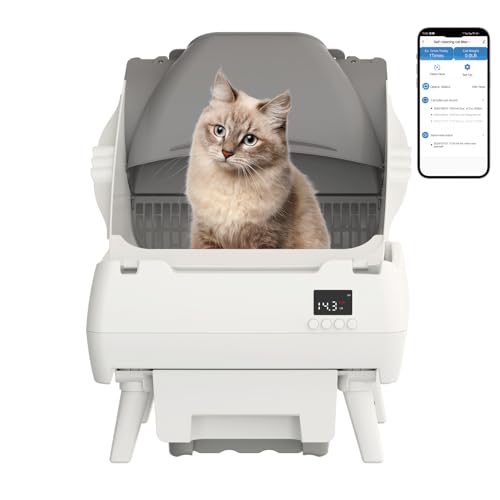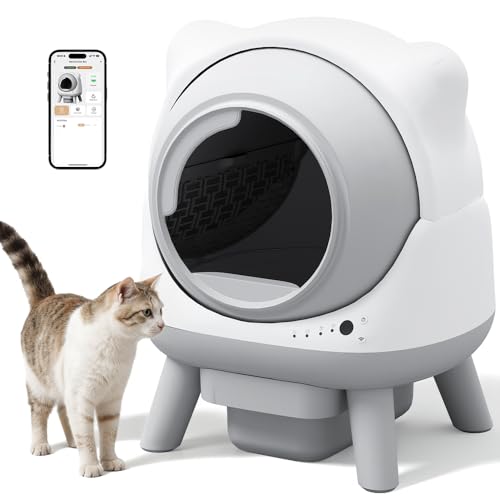The Importance of a Litter Box for Cats
When it comes to our beloved furry friends, cats, it’s essential to provide them with everything they need to live a happy and comfortable life. One of the most crucial things you can do for your cat is to provide them with a litter box. Here’s why it’s so important:
- Instinctive Need: Cats have an instinctive need to bury their waste. In the wild, they would dig a hole and cover it up to avoid attracting predators. A litter box mimics this natural behavior and allows your cat to fulfill their instincts in a safe and hygienic way.
- Privacy and Security: Cats are known for their independence and desire for privacy. Having a designated litter box provides them with a safe and secure place to do their business without feeling exposed or vulnerable. This ensures that they feel comfortable and can maintain their dignity.
- Convenience: Cats are clean animals by nature. By providing a litter box, you make it convenient for them to keep their living area tidy. They can easily access the litter box whenever nature calls, and you won’t have to worry about accidents around your home.
- Avoiding Stress: Changes in environment or routine can be stressful for cats. Having a consistent and easily accessible litter box helps them feel more secure and reduces the chance of stress-related issues like inappropriate urination or defecation.
- Health Monitoring: Monitoring your cat’s litter box habits is an essential part of their overall health care. By regularly checking on the litter box, you can be aware of any changes in urination or bowel movements that may indicate a health problem. This allows you to seek veterinary help promptly if needed.
Remember, choosing the right litter box and maintaining it properly is just as important as providing one. Keep it clean, use a litter that your cat prefers, and make sure it’s large enough for them to comfortably move around in. Your cat will thank you for it!
Now that you understand the importance of a litter box for cats, let’s explore whether they can find it in the dark.
Understanding Cats’ Natural Abilities
As a cat lover, you may have wondered about your feline friend’s abilities, especially when it comes to finding their litter box in the dark. Let’s delve into the natural instincts and abilities that make cats so remarkable.
- Exceptional Night Vision
Cats are known for their excellent night vision. Their eyes contain a high number of rod cells, which are specialized for low-light conditions. This means that even in the dimmest of rooms, your cat can navigate their way to the litter box without a problem. - Sensitivity to Light
Furthermore, cats have a specialized structure behind their retinas called the tapetum lucidum. This structure reflects light back through their retinas, enhancing their visual sensitivity in low-light situations. It’s like having a built-in flashlight in their eyes! - Sharp Hearing
In addition to their impressive vision, cats have exceptional hearing. Their ears can detect high-frequency sounds that are inaudible to human ears. This acute sense of hearing helps them locate their litter box, even in the dark, by listening for familiar sounds or the movement of litter. - Whisker Navigation
Have you ever noticed how cats use their whiskers to maneuver through narrow spaces? Well, these sensitive whiskers, known as vibrissae, also come in handy when it comes to finding their litter box. By brushing against walls or obstacles, your cat can gauge the distance and navigate their way to the litter box effortlessly. - Sense of Smell
Lastly, cats have an exceptional sense of smell. Their noses are equipped with millions of scent receptors that allow them to detect and distinguish various odors. This incredible sense of smell helps them locate their litter box based on the familiar scent of their waste.
Remember, cats possess incredible natural abilities that make them resourceful navigators, even in the dark. So, rest assured that your furry friend will have no trouble finding their litter box, regardless of the lighting conditions.
Now that you understand the remarkable natural abilities that enable cats to find their litter box, let’s move on to other important considerations related to cat hygiene.
Cats and Their Sight in the Dark
As a cat lover, you might be wondering how your feline friend can effortlessly find their litter box in the dark. It’s fascinating to discover that cats have some amazing natural abilities that make this task a breeze for them. Let’s dive into the world of a cat’s sight in the dark and unlock the secrets behind this unique ability.
Exceptional Night Vision
Cats have exceptional night vision, allowing them to navigate in low light conditions. Their eyes contain a specialized structure called the tapetum lucidum, which reflects light back through the retina. This enhances their vision in low light environments, making it easier for them to see objects, including their litter box, even in complete darkness.
Sensitivity to Light
In addition to their night vision, cats are also extremely sensitive to light. Their eyes have a higher number of rod cells compared to humans, which are responsible for detecting light intensity. This sensitivity allows cats to perceive even the faintest of light sources, helping them locate their litter box with ease.
Sharp Hearing
Another remarkable ability of cats is their sharp hearing. Cats have highly developed auditory senses that help them detect even the tiniest of sounds. This acute hearing allows them to orient themselves more effectively in the dark, enabling them to find their litter box based on a sound cue, such as the sound of litter scratching.
Whisker Navigation
Did you know that cat’s whiskers are not just for looks? Whiskers play a crucial role in a cat’s ability to navigate, especially in the dark. Whiskers are highly sensitive and can detect changes in air currents. Through whisker navigation, cats can determine the location and size of objects, helping them avoid obstacles and find their litter box effortlessly.
Strong Sense of Smell
Last but not least, a cat’s strong sense of smell is an invaluable tool when it comes to finding their litter box in the dark. Cats have a highly developed olfactory system, with scent receptors that are far more sensitive than humans. By relying on their sense of smell, cats can detect the familiar scent of their litter box, guiding them directly to where they need to go.
Factors That Affect Cats’ Ability to Find the Litter Box in the Dark
When it comes to finding their litter box in the dark, our feline friends have some remarkable abilities. As a cat lover, you may be curious to know what factors contribute to their incredible navigational skills. Let’s explore a few key factors that affect a cat’s ability to find the litter box even in complete darkness.
Night Vision: Cats have exceptional night vision, thanks to a specialized structure in their eyes called the tapetum lucidum. This reflective layer helps amplify the available light, allowing them to see clearly in low-light conditions. Their eyes are adapted to capture even the faintest of night-time movements, making it easier for them to navigate to their litter box at any time of the day.
Sensitivity to Light: Cats have a higher number of rod cells in their eyes. These cells are responsible for detecting light and motion. This heightened sensitivity to light enables them to see even the slightest changes in their surroundings, making it easier for them to find their litter box in dimly lit areas.
Sharp Hearing: Another amazing ability that helps cats locate their litter box in the dark is their acute hearing. Cats have a remarkable ability to pick up on even the faintest sounds, allowing them to follow cues and navigate their way to their litter box. This sharp sense of hearing ensures that they can find their way, even in pitch-black environments.
Whisker Navigation: Whiskers, known as vibrissae, play a crucial role in a cat’s sensory perception. These long, sensitive hairs help cats navigate through tight spaces. By brushing against objects, whiskers provide cats with tactile information about their surroundings, helping them locate the litter box. They can effortlessly maneuver through the darkness, guided by their whiskers.
Sense of Smell: Cats have an incredibly powerful sense of smell, with around 200 million odor-sensitive cells in their noses. This heightened sense of smell enables them to detect and follow scents, making it easier for them to find their litter box. Even in the dark, cats can rely on their sense of smell to guide them to their designated space.
With these incredible natural abilities, cats have a knack for finding their litter box in any lighting condition. Whether it’s their outstanding night vision, sensitivity to light, sharp hearing, whisker navigation, or strong sense of smell, these factors all contribute to their resourceful navigation skills.
Tips to Help Cats Find the Litter Box in the Dark
As a cat lover, you know that cats have exceptional night vision. But sometimes, even the best night vision won’t guarantee that they’ll find the litter box in the dark. So, here are some simple tips to help your furry friend navigate in low-light conditions:
1. Keep the litter box in a consistent location
Cats rely on their memory and spatial awareness to find their litter box. To make it easier for them in the dark, keep the litter box in a consistent spot. Avoid moving it around as this may confuse your cat and make it harder for them to find it.
2. Provide a night light
Adding a night light near the litter box can make all the difference. It will provide enough illumination for your cat to see where they’re going without disturbing their natural night vision. Choose a soft, low-wattage light that won’t be too harsh on their sensitive eyes.
3. Avoid clutter around the litter box
In low-light conditions, it’s essential to keep the area around the litter box free of any obstacles or clutter. Your cat relies on their sense of touch and memory to navigate, so a clear path will help them find their way easily.
4. Use familiar scents to guide them
Cats have a strong sense of smell, even in the dark. Consider using scented litter or placing a small amount of their used litter in a separate container nearby. This will help your cat recognize the scent and follow it to the litter box.
5. Make use of their natural instincts
Cats are natural explorers and are incredibly curious. Take advantage of this by placing a few strategically positioned toys or scratching posts near the litter box. The familiar objects will act as landmarks and help guide your cat to their destination.
Remember, cats rely on a combination of their senses to find their way in the dark. By providing a consistent location, a little extra lighting, and removing any obstacles, you’ll make it easier for your feline friend to find their litter box, even in the darkest of nights.
Conclusion
By implementing a few simple strategies, you can help your cat find their litter box even in the dark. Keeping the litter box in a consistent location allows them to develop a mental map and navigate with ease. Adding a night light near the litter box provides them with enough visibility to find their way. Avoiding clutter around the litter box ensures that there are no obstacles in their path. Using familiar scents, such as their own urine or litter, can also help guide them to the right spot. Lastly, tapping into their natural instincts, which include their keen sense of hearing and ability to rely on their whiskers, can further assist them in finding their litter box in low-light conditions. Remember, a little extra effort in creating a safe and accessible litter box environment can go a long way in ensuring your cat’s comfort and well-being.
Frequently Asked Questions
Q: How can I help my cat find their litter box in the dark?
A: To help your cat find their litter box in the dark, keep it in a consistent location and provide a night light nearby. Avoid clutter around the litter box and use familiar scents, such as their preferred litter, to guide them. Cats have natural instincts to navigate in low-light conditions, so make use of their abilities to find their litter box.

















